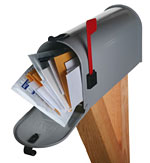
Washington state is one of a half dozen states considering legislation this year to create a "do not mail" list for residents, similar to the feds’ popular "do not call" registry.
And like the telemarketing industry’s cries that it would be utterly destroyed and millions of contented telemarketers would be out of a job, similar forces are mobilizing against the "do not mail" bills, including the Direct Marketing Association, the mail carriers’ union, and others who argue that junk mail is simultaneously essential, irreplaceable, and innocuous.
Bollocks.
Attempting to head off the bills before they pass, junk-mail defenders argue that, like telemarketing, junk mail’s only offense is it can be bothersome sometimes. But unlike dinner-interrupting telemarketing calls, they argue, no one dictates when you check the mail, therefore it can be done at your leisure, therefore it’s not actually that annoying, therefore what’s the big deal?
But of course, the environmental effects of junk mail are more sinister than those of a telephone call. Even if the annoyance of junk mail can be ignored, its environmental impacts can’t be.
But people will try. The National Association of Letter Carriers’ president, William H. Young, recently argued, as paraphrased by a direct mail news report, that "most advertising mailing is printed on recycled paper and postal patrons can recycle that mail." Well, OK then. Recycling has saved the day — twice over — and junk mail can’t be bad if it can be recycled. So why worry?
In short because — surprise! — sending unwanted ads to every household in your zip code is damn wasteful. The New American Dream has been quantifying just how wasteful:
"More than 100 million trees’ worth of bulk mail arrive in American mail boxes each year."
"In 2003, 5.4 million tons of catalogs and other direct mailings ended up in the U.S. municipal solid waste stream — enough to fill over 420,000 garbage trucks."
"California’s state and local governments spend $500,000 each year collecting and disposing of AOL’s direct mail disks alone."
"The production and disposal of junk mail consumes more energy than 2.8 million cars."
Junk mail isn’t innocuous.
But let’s not ignore workers’ complaints. In this case, as in so many others, it’s not a matter of environmentalists vs. workers or even the environment vs. jobs. A closer look shows how they can be intertwined.
It seems the mail carrier union’s main beef with a "do not mail" list is that it can impact their pay. As the Seattle Weekly explains …
… rural carriers, unlike their metropolitan counterparts, get paid based on volume rather than the number of hours they work. Every year, an alternating sample of two or four weeks is conducted to count the number of pieces delivered on each route, determining the salary for the following year; the greater the number, the higher the salary."
This counterintuitive pay scale need not exist. Pay based on hours worked for everyone seems most sensible and doesn’t needlessly tie mail-carrier welfare to ads printed on what used to be old-growth forest clogging up someone’s mailbox. It would even be possible to write recommended pay-scale reforms language into the "do not mail" bills. Such a simple alteration could turn mail carriers into allies while we all work toward the goal of reduced waste.
Of course, the "do not mail" bills would continue to allow "charities, political campaigns, and organizations that have existing relationships with clients … to send direct mail to people on the [do not mail] list." But businesses could potentially save money by only being allowed to mail to people who want to receive their offers. And while a well-run sweepstakes or two could certainly expand the ranks of people who have a "relationship" with marketing companies, "do not mail" legislation is still a decent idea.
Here’s to de-junkmailing people’s lives.



